FEATURED ARTICLES [Latest news updates]
 United States has higher percentage of forest loss than Brazil
United States has higher percentage of forest loss than Brazil
(04/26/2010) Forests continue to decline worldwide, according to a new study in the Proceedings of the National Academy of Science (PNAS). Employing satellite imagery researchers found that over a million square kilometers of forest were lost around the world between 2000 and 2005. This represents a 3.1 percent loss of total forest as estimated from 2000. Yet the study reveals some surprises: including the fact that from 2000 to 2005 both the United States and Canada had higher percentages of forest loss than even Brazil.
 Amazon Tribes Embrace Technology to Protect their Rainforest Home [GeoWorld]
Amazon Tribes Embrace Technology to Protect their Rainforest Home [GeoWorld]
(04/26/2010) Deep in the most remote jungles of South America, Amazon Indians are using GPS units, Android handheld devices, Google Earth and other technologies to protect their fast-dwindling home through “cultural mapping.” Tribes in Suriname, Brazil and Colombia are combining their traditional knowledge of the rainforest with western technology to conserve forests and maintain ties to their history and cultural traditions, which include profound knowledge of the forest ecosystem and medicinal plants.
 How hornbills keep Asian rainforests healthy and diverse, an interview with Shumpei Kitamura
How hornbills keep Asian rainforests healthy and diverse, an interview with Shumpei Kitamura
(04/26/2010) Hornbills are one of Asia's most attractive birds. Large, colorful, and easier to spot than most other birds, hornbills have become iconic animals in the tropical forests of Asia. Yet, most people probably don't realize just how important hornbills are to the tropical forests they inhabit: as fruit-eaters, hornbills play a key role in dispersing the seeds of tropical trees, thereby keeping forests healthy and diverse. Yet, according to tropical ecologist and hornbill-expert Shumpei Kitamura, these beautiful forest engineers are threatened by everything from forest loss to hunting to the pet trade.
 World failing on every environmental issue: an op-ed for Earth Day
World failing on every environmental issue: an op-ed for Earth Day
(04/22/2010) The biodiversity crisis, the climate crisis, the deforestation crisis: we are living in an age when environmental issues have moved from regional problems to global ones. A generation or two before ours and one might speak of saving the beauty of Northern California; conserving a single species—say the white rhino—from extinction; or preserving an ecological region like the Amazon. That was a different age. Today we speak of preserving world biodiversity, of saving the 'lungs of the planet', of mitigating global climate change. No longer are humans over-reaching in just one region, but we are overreaching the whole planet, stretching ecological systems to a breaking point. While we are aware of the issues that threaten the well-being of life on this planet, including our own, how are we progressing on solutions?
 Jane Goodall renews her faith in nature and humanity during the "Gombe 50" anniversary, An interview with Dr. Jane Goodall
Jane Goodall renews her faith in nature and humanity during the "Gombe 50" anniversary, An interview with Dr. Jane Goodall
(04/12/2010) 2010 marks a monumental milestone for the Jane Goodall Institute (JGI) and its founder, Dr. Jane Goodall, DBE. Fifty years ago, Goodall, who is today a world-renowned global conservation leader, first set foot on the shores of Lake Tanganyika, in what is now Tanzania’s Gombe National Park. The chimpanzee behavioral research she pioneered at Gombe has produced a wealth of scientific discovery, and her vision has expanded into a global mission 'to empower people to make a difference for all living things.' Time, however, has not stood still for Gombe. The wild chimps of the area have suffered as the local human population has swelled. Gombe National Park is now a forest fragment, a 35-square-kilometer island of habitat isolated in a sea of subsistence farming. Because the problems facing Gombe—unsustainable land practices, overpopulation, and a cycle of poverty—are typical of many other areas, lessons learned by Dr. Goodall and her team provide valuable insights for solutions at Gombe and beyond.
 Chaos and the Accord: Climate Change, Tropical Forests and REDD+ after Copenhagen
Chaos and the Accord: Climate Change, Tropical Forests and REDD+ after Copenhagen
(04/06/2010) The Copenhagen Accord, forged at COP15 upended international efforts to confront
climate change. Never before have 115 Heads of State gathered together at one
time, let alone for the singular purpose of crafting a new climate change
agreement. Even though the new Accord is still in intensive care, two things
are already clear. First, we have entered an entirely new world. And second,
tropical forests have the greatest potential to breathe life into the new
agreement.
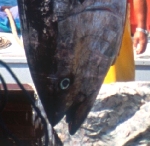 History repeats itself: the path to extinction is still paved with greed and waste
History repeats itself: the path to extinction is still paved with greed and waste
(04/05/2010) As a child I read about the near-extinction of the American bison. Once the dominant species on America's Great Plains, I remember books illustrating how train-travelers would set their guns on open windows and shoot down bison by the hundreds as the locomotive sped through what was left of the wild west. The American bison plunged from an estimated 30 million to a few hundred at the opening of the 20th century. When I read about the bison's demise I remember thinking, with the characteristic superiority of a child, how such a thing could never happen today, that society has, in a word, 'progressed'. Grown-up now, the world has made me wiser: last month the international organization CITES (Convention on International Trade in Endangered Species) struck down a ban on the Critically Endangered Atlantic bluefin tuna. The story of the Atlantic bluefin tuna is a long and mostly irrational one—that is if one looks at the Atlantic bluefin from a scientific, ecologic, moral, or common-sense perspective.
 Seed dispersal in the face of climate change, an interview with Arndt Hampe
Seed dispersal in the face of climate change, an interview with Arndt Hampe
(04/05/2010) Without seed dispersal plants could not survive. Seed dispersal—i.e. birds spreading seeds or wind carrying seeds—means the mechanism by which a seed is moved from its parent tree to a new area; if fortunate the seed will sprout in its new resting place, produce a plant which will eventually seed, and the process will begin anew. But in the face of vast human changes—including deforestation, urbanization, agriculture, and pasture lands—as well as the rising specter of climate change, researchers wonder how plants will survive, let alone thrive, in the future?
Colombia photos
(04/01/2010) For most of March, mongabay.com's Rhett Butler was in Colombia. Here are some photos from the trip.
Farming snails to save the world's rarest gorillas
(04/28/2010) In a place of poverty and hunger, how do you save a species on the edge of extinction? A difficult question that conservationists have long-been working to tackle, the Wildlife Conservation Society (WCS) has come up with a new plan to protect the world's most endangered gorilla, the Cross River gorilla, from poachers by providing locals with an alternate and better income from farming snails.
 A day to celebrate (and save) the world's amphibians: the 2nd Annual Save the Frogs Day
A day to celebrate (and save) the world's amphibians: the 2nd Annual Save the Frogs Day
(04/28/2010) Friday, April 30th is for the frogs: educational programs, conservation walks with experts, frog leaping races, and the world's first protest to save frogs are all planned for the world's 2nd Annual Save the Frogs Day. Organized by the non-profit SAVE THE FROGS!, events are so far planned in 15 countries on every continent besides Antarctica—fittingly the only continent that lacks amphibians.
Large-scale soy farming in Brazil pushes ranchers into the Amazon rainforest
(04/28/2010) Industrial soy expansion in the Brazilian Amazon has contributed to deforestation by pushing cattle ranchers further north into rainforest zones, reports a new study published the journal Environmental Research Letters.
Madagascar passes decree banning rainforest timber trade
(04/28/2010) Madagascar's transitional government has finally signed a decree banning the logging and trade of precious hardwoods, a month after announcing the moratorium.
Photo: monster worm is less than a monster
(04/28/2010) Some places have Loch Ness and Bigfoot, but the Palouse prairie of the western United States has the giant Palouse earthworm. Reported to stretch 3 feet long, spit, and—even more strangely—smell like lilies, the earthworm has become apart of the region's folklore and has only been seen a few times since the 1980s leading to concerns that it was gravely endangered and maybe even extinct.
Another new monitor lizard discovered in Southeast Asia
(04/28/2010) Just weeks after scientists announced the discovery of a new monitor lizard in the Philippines, researchers have uncovered another unknown monitor inhabiting Southeast Asia. Described in Zootaxa, the new torch monitor (Varanus obor) is found only on the tiny island of Sanana, in the western Moluccan islands of Indonesia.
Food crisis in Niger occurring "out of the public eye"
(04/26/2010) The West African nation of Niger is facing an increasingly alarming food crisis as the UN announced it would double the number of people it was feeding today despite continuing budget shortfalls in its World Food Program (WFP). Failing rains have caused crop yields in Niger to decline, while food prices are rising and livestock prices falling. Officials say these trends have created a perfect-storm for a crisis in Niger, which according to Amadou Sayo from CARE International, is occurring "out of the public eye."
150,000 turn out for climate rally in Washington DC
(04/26/2010) A rally in support of strong action on climate change drew some 150,000 people to the National Mall in Washington DC according to organizers. The rally—which also celebrated the 40th Anniversary of Earth Day—alternated its program with music and speakers.
After oil rig explosion, leaking crude threatens Gulf of Mexico
(04/26/2010) Just weeks after a Chinese coal barge rammed the Great Barrier Reef, cutting a nearly two-mile swath through the reef and spilling three tons of engine fuel, fragile marine ecosystems are again threatened. Last Tuesday a BP oil rig platform exploded in the Gulf of Mexico, likely killing eleven workers. The blast also left oil leaking from the drill hole estimated at 42,000 gallons (or 1,000 barrels) of oil per day.
Killer whales split into three separate species
(04/25/2010) Using genetic evidence scientists have discovered that the world’s killer whales, also known as orcas (Orcinus orca), likely represent at least three separate species.
Got milk: 3 percent of greenhouse gases from milk production
(04/21/2010) Just less than 3 percent of the world's greenhouse gas emissions come from the production of milk, according to a new study by the UN Food and Agricultural Organization (FAO). Covering dairy producing animals from small nomadic herds to massive industrialized dairy operations, the FAO study factors in the production, processing, and transportation of milk as well as the fertilizer, pesticides, and feed used in the dairy industry. The total rises 4 percent if using dairy animals for meat is included.
 Oil company to cut 454 kilometers of seismic lines in uncontacted tribe territory
Oil company to cut 454 kilometers of seismic lines in uncontacted tribe territory
(04/21/2010) Repsol YPF, a Spanish-Argentine oil company, plans to cut 454 kilometers (282 miles) of seismic lines in a territory of the Peruvian rainforest known to be home to uncontacted indigenous peoples, according to a press release from Survival International. To construct seismic lines paths will be cleared in the forest and explosives set-off regularly. Seismic lines allow energy companies to locate oil deposits by creating a cross sectional view of the subsurface.
Off and on again: Belo Monte dam goes forward, protests planned
(04/20/2010) An auction to build the Belo Monte dam, a massive hydroelectric project in Brazil, is going ahead despite two court-ordered suspensions, both of which have been overturned. The dam, which would be the world's third-largest, has been criticized by indigenous groups, environmental organizations, and most recently filmmaker James Cameron who created the wildly popular Avatar.
Where do forest carbon markets go from here?
(04/20/2010) For thousands of years, we have been planting and growing trees without difficulty. It's simple, and forest carbon business strategy can be, too. In fact, it's core to what I'm trying to teach the MBA/MS students in my course at the Erb Institute this semester: If the world's best available technology for removing carbon dioxide from the atmosphere is employing the natural photosynthetic capacity of natural forest management, we can too.
 Close to a billion species: ocean exploration reveals shocking diversity of tiny marine life
Close to a billion species: ocean exploration reveals shocking diversity of tiny marine life
(04/19/2010) Biologists worldwide may have to start re-evaluating their estimates of the number of species on Earth, since expeditions documenting the oceans' tiniest species have revealed shocking diversity: in the tens of millions of species, at least, and according to one researcher "closer to a billion". Fourteen field projects sent out by the Census of Marine Life focused on the oceans' smallest inhabitants: microbes, zooplankton, and tiny burrowing species inhabiting the deep sea bed. What they found was astounding.
Paper company loses green certification after rainforest destruction in Indonesia
(04/18/2010) The Forest Stewardship Council (FSC), a global certifier of sustainably managed forest, has dropped another Indonesian company for the destruction of rainforests. Asia Paper Resources International Limited (APRIL), has had its certification suspended due to evidence of conversion of rainforests for acacia plantations, the destruction of 'High Conservation Value Forest', draining peatlands, as well as continuing conflicts with local communities. The decision was made by the Rainforest Alliances Smartwood, an accreditation program with the FSC.
Skoll Foundation Awards $2.2 millon to avoided deforestation and the ecosystem services market
(04/18/2010) This week the Skoll Foundation for Social Entrepreneurship awarded its annual Awards for Social Entrepreneurship and three of the seven prizes went to individuals and organizations focused on tropical forests and ecosystem services, including Forest Trends, Imazon, and Telapak. Each award is worth $765,000, which amounts to over $2.2 million for this space. The awards were presented at the Skoll World Forum in Oxford, United Kingdom.
Is deforestation rising or falling in the Amazon?
(04/18/2010) Last week Brazil's National Space Agency INPE reported a 51 percent drop in Amazon deforestation in the six months ended February 2010 compared with the year earlier period. But the seemingly happy news for environmentalists may be premature.
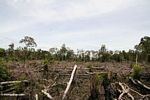 Nestle shareholder meeting interrupted by Greenpeace orangutans
Nestle shareholder meeting interrupted by Greenpeace orangutans
(04/15/2010) Nestle's shareholder meeting turned raucous today, as Greenpeace protesters were arrested in full-orangutan outfits outside the meeting and inside Greenpeace activists—in a scene out of a spy movie—propelled down from the ceiling and dropped a giant banner and a shower of leaflets above the shareholders' heads. "Nestlé's chair, Peter Brabeck-Letmathe, was explaining how well the company had performed over the last fiscal year when noises were heard up in the roof and leaflets began raining down, not at all unlike a shower of cash," describes a Greenpeace blog entry today.
 New report alleges Sarawak government, police, and loggers "act in collusion to harass and intimidate indigenous communities"
New report alleges Sarawak government, police, and loggers "act in collusion to harass and intimidate indigenous communities"
(04/15/2010) A new report by JOANGOHutan, the Malaysian Network of Indigenous Peoples and Non-Governmental Organizations, paints an atmosphere of abuse and ambivalence toward indigenous communities embroiled in land disputes in the Malaysian state of Sarawak on the island of Borneo. According to the report, there are currently 140 land dispute cases in limbo in the Sarawak courts. Indigenous groups are fighting loggers, oil palm plantation developers, and the paper industry for their tribal lands, yet indigenous tribes have not found advocates in state government.
Climatologists cleared of any "scientific malpractice"
(04/15/2010) Two inquiries into the research of several climatologists at the University of East Anglia's Climate Research Unit (CRU) have now cleared the researchers of any wrong-doing. The second inquiry, which looked specifically at 11 representatives studies including global temperature findings and work with tree rings, announced yesterday that they found "no evidence of any deliberate scientific malpractice in any of the work of the Climatic Research Unit, and had it been there we believe that it is likely that we would have detected it," according to the panel, which included experts from the United States, Switzerland, and the UK.
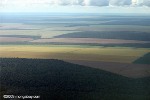 Turning to the matrix: a more accurate way to predict extinction
Turning to the matrix: a more accurate way to predict extinction
(04/14/2010) According to most conservationists the globe is striding into the midst of the Sixth Mass Extinction. Species populations worldwide are dropping and in many cases species are vanishing all together due to pollution, climate change, poaching and hunting, overconsumption, invasive species, and exotic diseases, but no threat proves more pervasive and devastating for the world's species than habitat loss.
Black list uncovers least transparent companies
(04/14/2010) Corporate Responsibility Magazine has released its first annual list of the 30 least transparent companies, dubbed the 'black list'. Looking at corporations traded on the US stock market in the Russell 1,000—the top 1,000 stocks in the Russell 3,000 list—the magazine pinpointed the bottom 30, exposing those companies that choose to hide in the dark.
Environmentalists say President of Philippines not deserving of conservation award
(04/13/2010) Filipino environmentalists and religious leaders have expressed shock and anger that Gloria Macapagal-Arroyo, the President of the Philippines, has been chosen to receive a conservation award from the US Congress in Washington, DC today according to the Philippine Daily Enquirer.
Whiskas offers Critically Endangered species-flavored cat food
(04/13/2010) In a truly bizarre product offering, Whiskas presented a new line of bluefin tuna-flavored cat food before quickly eliminating the product "due to public concerns", according to Greenpeace UK.
Amazon nun-killer found guilty in Brazil
(04/13/2010) The Brazilian rancher accused of ordering the murder of an American missionary has been sentenced to 30 years in prison, reports the Associated Press (AP).
$6B forest conservation plan lacking in transparency, indigenous participation, say activists
(04/13/2010) The process to establish REDD+, a proposed climate change mitigation mechanism that would reduce greenhouse gas emissions by funding conservation and sustainable management of tropical forests (REDD+), is lacking in transparency and failing to include civil society organizations and indigenous peoples, say activists across forty NGOs.
 Cochabamba Climate Conference: the Coca Contradiction
Cochabamba Climate Conference: the Coca Contradiction
(04/11/2010) In the high stakes game of geopolitics, the small and economically disadvantaged Andean nation of Bolivia has little clout. Now, however, the country’s indigenous president Evo Morales wants to establish more of a significant voice on the world stage. Recently, he has turned himself into something of a spokesperson on the issue of climate change. Decrying the failure of world leaders to come to a satisfactory agreement on global warming, he is intent on shaming the Global North into addressing climate change. Whatever Bolivia lacks in terms of political and economic muscle, Morales would like to offset through skilled use of moral persuasion.
 Hope for survival as isolated orangutans joined by rope bridge
Hope for survival as isolated orangutans joined by rope bridge
(04/11/2010) Researchers in the Malaysian state of Sabah in Borneo are joyful after receiving confirmation that a young male orangutan used a rope bridge to cross a river, which has separated one orangutan population from another. Due to logging and clearing forests for oil palm plantations, which cover 18 percent of land in Sabah, orangutans on the Kinabantangan River have been cut into fragmented populations.
16 percent of mangrove species threatened with extinction
(04/11/2010) The first ever assessment of mangrove species by the IUCN Red List found 11 out of 70 mangrove species threatened with extinction, including two which were listed as Critically Endangered. Threats include coastal development, logging, agriculture, and climate change.
Photo: Lemur species rediscovered after 100 years
(04/09/2010) A species of lemur has been rediscovered more than a century after it was last spotted, report researchers from McGill University, the German Primate Centre in Göttingen Germany, the University of Antananarivo in Madagascar, and the University of Massachusetts.
Certified sustainable palm oil sales reach record level
(04/09/2010) Sales of palm oil certified under the green criteria set by the Roundtable on Sustainable Palm Oil (RSPO) reached a record high in March, climbing nearly 8 percent over February 2010 to 136,000 metric tons, reports the RSPO in its monthly bulletin.
 Photos: rescued sun bears in Borneo moved to new facility
Photos: rescued sun bears in Borneo moved to new facility
(04/08/2010) Rescued sun bears in Sabah, Borneo are getting a new home this week. The Bornean Sun Bear Conservation Center (BSBCC) has finished Phase 1 of its construction of a new home for the bears. Eventually the center will include visitor facilities and observation gallery where tourists will have the chance to watch the bears. For now, though, the bears will enjoy brand new state-of-the-art facilities and, for the first time, access to a pristine forest.
Scientists: 60 million USD needed to gauge the global threat to biodiversity
(04/08/2010) One of the greatest barriers to saving the world's biodiversity is simply a lack of knowledge: to date less than 50,000 species have been surveyed by the IUCN Red List regarding their threat level, while the vast majority of the world's species are left unanalyzed especially fungi, plants, fish, reptiles, and insects and other invertebrates. To address this problem, some of the world's top biologists have proposed a 60-million US dollar program they dub the 'barometer of biodiversity' to gather a representative sample of all taxons.
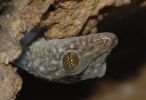 Forgotten species: the subterranean Gekko gigante
Forgotten species: the subterranean Gekko gigante
(04/08/2010) Travelers to tropical destinations are likely familiar with the gecko. Clinging to walls and ceilings of buildings—sometimes staring down at you from the bedroom ceiling or glancing at you quizzically from the bathroom door—the small adhesive-footed lizard could be aptly described in some tropical areas as ubiquitous. Despite the apparent commonness of some species, geckos are delightful lizards with round wide eyes, a thick gripping tongue, and of course that amazing knack of seemingly defying gravity with specialized toe pads. But not all geckos are as easily found—or as common—as those hanging out, literally, in a jungle lodge. The Gekko gigante, also known as the Gigante narrow-disked gecko, has been little- noticed by the public. Even scientists know little about the lovely gray-and-blue gecko beyond the fact that it lays its eggs on cool moist cave walls in two Philippine Islands.
 Unilever backtracks: may purchase palm oil from Sinar Mas
Unilever backtracks: may purchase palm oil from Sinar Mas
(04/07/2010) The world's biggest buyer of palm oil, Unilever, says it will again purchase palm oil from PT SMART, a subsidiary of Indonesian company Sinar Mas, if allegations about deforestation and peatland destruction prove untrue, or if Sinar Mas shows it is addressing the issue. Last December, the food and cosmetic giant, Unilever, suspended its $32.6 million contract with Sinar Mas after an independent audit—spurred by a 2008 Greenpeace report—showed that the Indonesian company was involved in the illegal destruction of rainforests and peatlands. Yet the company now seems to be signaling that the contract is back on the table even as it touts its sustainability efforts to the public.
US Eastern forests suffer "substantial" decline: 3.7 million hectares gone
(04/07/2010) The United States' Eastern forests have suffered a "substantial and sustained net loss" over the past few decades, according to a detailed study appearing in BioScience. From 1973 to 2000, Eastern have declined by 4.1 percent or 3.7 million hectares. Deforestation occurred in all Eastern regions, but the loss was most concentrated in the southeastern plains.
Brazilian cattle giants move toward zero deforestation in the Amazon
(04/07/2010) Brazilian cattle companies are making progress in their effort to map their supply-chains in the Amazon but are still falling short of their commitment to zero deforestation in the region, reports Greenpeace after a meeting at the Brazilian Association of Meat Exporters (ABIEC) in Sao Paulo.
Botswana photos
(04/07/2010) Last year mongabay.com's Jeremy Hance was in Botswana and Zimbabwe. Here are some photos from the trip.
Photo: Fruit-eating dragon discovered in the Philippines
(04/07/2010) Scientists have discovered a new species of giant lizard in the unlikeliest of places: a highly populated, deforested landscape in the Philippines.
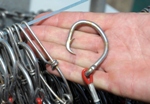 New report finds millions of marine turtles killed by fisheries, not thousands
New report finds millions of marine turtles killed by fisheries, not thousands
(04/06/2010) Humankind's appetite for seafood has had a bigger impact on the world's marine turtles than long thought. A new report by Conservation International (CI) in partnership with Duke University’s Project GloBAL (Global By-catch Assessment of Long-lived Species) finds that in the past eighteen years it is likely millions of marine turtles have been killed as bycatch by the world's fisheries.
 New blind snake discovery
New blind snake discovery
(04/06/2010) Call them survivors: blindsnakes have been identified as one of the few groups of organisms that inhabited Madagascar when it broke from the Indian subcontinent around 100 million years ago. According to a new study in Biology Letters, blindsnakes not only survived the split of Madagascar and India, but likely traveled from Asia to Australia and Africa to South America on floating vegetation, the latter a journey that may have taken six months of drifting on ocean currents. "Blindsnakes are not very pretty, are rarely noticed, and are often mistaken for earthworms," says Blair Hedges of her subjects. "Nonetheless, they tell a very interesting evolutionary story."
 Once common tortoise from Madagascar will be 'extinct in 20 years'
Once common tortoise from Madagascar will be 'extinct in 20 years'
(04/05/2010) The radiated tortoise, once common throughout Madagascar, faces extinction within the next 20 years due to poaching for its meat and the illegal pet trade, according to biologists with the Turtle Survival Alliance (TSA) and the Wildlife Conservation Society (WCS). Returning from field surveys in southern Madagascar's spiny forest, they found regions without a single turtle. Locals said that armed bands of poachers were taking truckloads of tortoises to be sold in meat markets. The tortoise is also popular in the underground pet trade, although it is protected by CITES (Convention on International Trade in Endangered Species).
New timber ban failing to stop illegal logging in Madagascar
(04/04/2010) Rainforest timber continues to be cut illegally from Madagascar's national parks despite a recently announced moratorium on precious wood exports and logging, reports a source from the Indian Ocean island nation.
Film Director James Cameron’s Next Film on the Amazon
(04/04/2010) Fresh off his huge blockbuster success with Avatar, James Cameron is taking a commendable stand on indigenous issues in the rainforest. Flying down to Brazil’s Amazonian city of Manaus recently, the film director criticized the Belo Monte hydro electric dam project. "For people living along the river, as they have for millennia," he said, "the dam will end their way of life. I implore the Brazilian government, and President Lula, to reconsider this project."
Madagascar site for kids now in Indonesian
(04/02/2010) Thanks to Wendi Setia Permana, the Madagascar site for kids is now available in Indonesian (Bahasa).
Cyber attacks against mine opponents in Vietnam, says Google
(04/02/2010) Malicious software is being used to spy on critics of a controversial bauxite mine in Vietnam, reports Google.
Most popular news articles for March
(04/01/2010) Most popular mongabay.com news articles for March 2010.
 What happened to China?: the nation's environmental woes and its future
What happened to China?: the nation's environmental woes and its future
(04/01/2010) China has long been an example of what not to do to achieve environmentally sustainability. Ranking 133rd out of 146 countries in 2005 for environmental performance, China faces major environmental problems including severe air and water pollution, deforestation, water-issues, desertification, extinction, and overpopulation. A new article in Science discusses the complex issues that have led to China's environmental woes, and where the nation can go to from here.
James Cameron, in real life, fights to save indigenous groups from massive dam construction in Brazil
(04/01/2010) After creating a hugely successful science-fiction film about a mega-corporation destroying the indigenous culture of another planet, James Cameron has become a surprisingly noteworthy voice on environmental issues, especially those dealing with the very non-fantastical situation of indigenous cultures fighting exploitation. This week Cameron traveled to Brazil for a three-day visit to the Big Bend (Volta Grande) region of the Xingu River to see the people and rainforests that would be affected by the construction of the Belo Monte Hydroelectric Dam. Long-condemned by environmentalists and indigenous-rights groups, the dam would destroy 500 square kilometers of pristine rainforest and force the relocation of some 12,000 people.
Mars to use only sustainably-sourced fish in pet food by 2020
(04/01/2010) Mars, Inc. announced Thursday it will use only sustainably-sourced fish in its pet products, including PEDIGREE®, SHEBA® and WHISKAS® branded products, by 2020.
Malaysian palm oil grower loses case over damages to rainforest community
(04/01/2010) IOI group suffered a legal setback this week when the Miri High Court — a court for Miri District in Sarawak, a state in Malaysian Borneo — ruled that the palm oil grower is liable for damages caused by the destruction of land belonging to Long Teran Kanan, a Kayan native community. The legal battle has dragged on for 12-years but now represents an important precedent for forest-dependent communities in Malaysia, reports the Bruno Manser Fund, an NGO that campaigns on behalf of Sarawak's forest people.



 United States has higher percentage of forest loss than Brazil
United States has higher percentage of forest loss than Brazil  Amazon Tribes Embrace Technology to Protect their Rainforest Home [GeoWorld]
Amazon Tribes Embrace Technology to Protect their Rainforest Home [GeoWorld] How hornbills keep Asian rainforests healthy and diverse, an interview with Shumpei Kitamura
How hornbills keep Asian rainforests healthy and diverse, an interview with Shumpei Kitamura World failing on every environmental issue: an op-ed for Earth Day
World failing on every environmental issue: an op-ed for Earth Day Jane Goodall renews her faith in nature and humanity during the "Gombe 50" anniversary, An interview with Dr. Jane Goodall
Jane Goodall renews her faith in nature and humanity during the "Gombe 50" anniversary, An interview with Dr. Jane Goodall Chaos and the Accord: Climate Change, Tropical Forests and REDD+ after Copenhagen
Chaos and the Accord: Climate Change, Tropical Forests and REDD+ after Copenhagen History repeats itself: the path to extinction is still paved with greed and waste
History repeats itself: the path to extinction is still paved with greed and waste Seed dispersal in the face of climate change, an interview with Arndt Hampe
Seed dispersal in the face of climate change, an interview with Arndt Hampe


 A day to celebrate (and save) the world's amphibians: the 2nd Annual Save the Frogs Day
A day to celebrate (and save) the world's amphibians: the 2nd Annual Save the Frogs Day Oil company to cut 454 kilometers of seismic lines in uncontacted tribe territory
Oil company to cut 454 kilometers of seismic lines in uncontacted tribe territory Close to a billion species: ocean exploration reveals shocking diversity of tiny marine life
Close to a billion species: ocean exploration reveals shocking diversity of tiny marine life New report alleges Sarawak government, police, and loggers "act in collusion to harass and intimidate indigenous communities"
New report alleges Sarawak government, police, and loggers "act in collusion to harass and intimidate indigenous communities" Turning to the matrix: a more accurate way to predict extinction
Turning to the matrix: a more accurate way to predict extinction Cochabamba Climate Conference: the Coca Contradiction
Cochabamba Climate Conference: the Coca Contradiction Hope for survival as isolated orangutans joined by rope bridge
Hope for survival as isolated orangutans joined by rope bridge  Photos: rescued sun bears in Borneo moved to new facility
Photos: rescued sun bears in Borneo moved to new facility  Forgotten species: the subterranean Gekko gigante
Forgotten species: the subterranean Gekko gigante Unilever backtracks: may purchase palm oil from Sinar Mas
Unilever backtracks: may purchase palm oil from Sinar Mas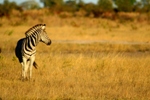
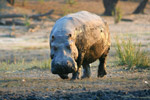

 New report finds millions of marine turtles killed by fisheries, not thousands
New report finds millions of marine turtles killed by fisheries, not thousands New blind snake discovery
New blind snake discovery Once common tortoise from Madagascar will be 'extinct in 20 years'
Once common tortoise from Madagascar will be 'extinct in 20 years' What happened to China?: the nation's environmental woes and its future
What happened to China?: the nation's environmental woes and its future